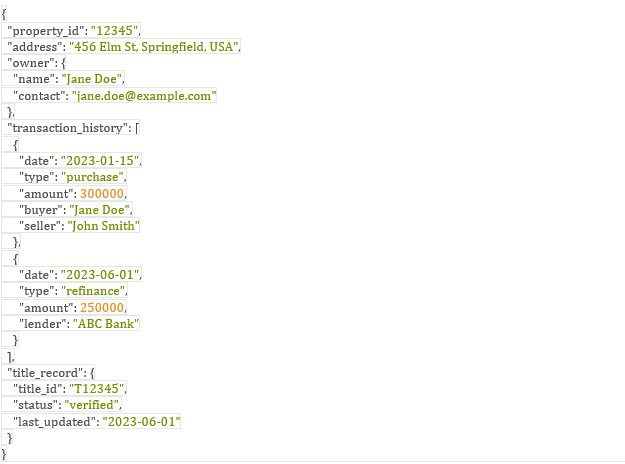Introduction
The real estate industry is undergoing a profound transformation, largely driven by technological advancements. Among these innovations, blockchain technology stands out as a revolutionary force, promising to enhance efficiency, security, and transparency in real estate transactions. This blog post explores the multifaceted applications of blockchain in real estate, detailing its mechanisms, benefits, and future potential.
What is Blockchain in Real Estate?
Blockchain technology is fundamentally a decentralized and distributed ledger system that records transactions across multiple computers. This ensures that the data is secure, transparent, and immutable. In the context of real estate, blockchain can be utilized to streamline various processes, including property transactions, title management, and contract execution.
Key Features of Blockchain
- Decentralization: Unlike traditional databases that rely on a central authority, blockchain operates on a peer-to-peer network. This reduces the risk of fraud and increases trust among parties involved in a transaction.
- Immutability: Once a transaction is recorded on the blockchain, it cannot be altered or deleted. This feature ensures the integrity of property records and prevents disputes over ownership.
- Transparency: All transactions on the blockchain are visible to authorized participants, enhancing accountability and trust.
- Smart Contracts: These are self-executing contracts with the terms of the agreement directly written into code. Smart contracts automate processes, reducing the need for intermediaries and expediting transactions.
Blockchain Real Estate Transactions
Blockchain technology is reshaping the way real estate transactions are conducted. By leveraging its unique features, stakeholders can experience a more efficient and secure transaction process.
The Traditional Real Estate Transaction Process
Traditionally, real estate transactions involve multiple intermediaries, including real estate agents, title companies, and banks. This process can be time-consuming, costly, and prone to errors. Key steps in traditional transactions include:
- Property Listing: Agents list properties on various platforms, often leading to information discrepancies.
- Due Diligence: Buyers conduct thorough checks on property titles, liens, and other legal documents, which can be cumbersome.
- Negotiation: Parties negotiate terms, often requiring extensive back-and-forth communication.
- Closing: The closing process typically involves numerous documents and signatures, which can delay the transaction.
How Blockchain Transforms Transactions
- Elimination of Intermediaries: Blockchain allows for direct peer-to-peer transactions, reducing the need for intermediaries and associated costs.
- Streamlined Due Diligence: Property records stored on the blockchain are easily accessible and verifiable, expediting the due diligence process.
- Automated Negotiation and Closing: Smart contracts can automate negotiations and closing processes, ensuring that all terms are met before the transaction is finalized.
- Real-Time Updates: Changes to property records are updated in real-time, providing all parties with the most current information.
Blockchain Technology in Commercial Real Estate Transactions
Commercial real estate (CRE) transactions involve unique challenges, including high-value deals, complex contracts, and lengthy approval processes. Blockchain technology offers solutions tailored to these challenges.
Tokenization of Commercial Properties
Tokenization refers to the process of creating digital tokens that represent ownership shares in a property. This approach has several advantages:
- Fractional Ownership: Investors can purchase smaller shares of high-value properties, increasing accessibility to commercial real estate investments.
- Increased Liquidity: Tokenized assets can be traded on blockchain platforms, providing investors with greater liquidity compared to traditional real estate investments.
- Global Reach: Blockchain facilitates cross-border transactions, allowing investors from different countries to participate in commercial real estate markets.
Smart Contracts in Commercial Transactions
Smart contracts can significantly streamline commercial real estate transactions by automating various processes:
- Lease Agreements: Smart contracts can manage lease agreements, automatically executing terms such as rent payments and maintenance responsibilities.
- Sales Transactions: In a sales transaction, smart contracts can ensure that funds are only released once all conditions are met, reducing the risk of fraud.
How is Blockchain Used in Real Estate?
Blockchain technology can be applied in various ways across the real estate sector, enhancing efficiency and security.
Property Title Management
One of the most significant applications of blockchain in real estate is in property title management. Traditionally, maintaining property titles has been a labor-intensive process prone to errors and fraud. Blockchain offers a secure and immutable solution:
- Secure Title Records: Property titles can be stored on the blockchain, ensuring that they are tamper-proof and easily verifiable.
- Simplified Title Searches: With all title records stored in one place, title searches become quicker and more efficient.
Real Estate Marketplaces
Blockchain can facilitate the creation of decentralized real estate marketplaces, where buyers and sellers can interact directly without intermediaries. Key features include:
- Transparent Listings: Properties can be listed with verified information, reducing the risk of misrepresentation.
- Direct Transactions: Buyers can purchase properties directly from sellers, streamlining the transaction process.
Crowdfunding Real Estate Projects
Blockchain technology enables crowdfunding for real estate projects, allowing multiple investors to pool their resources to finance developments. This approach has several benefits:
- Lower Barriers to Entry: Smaller investors can participate in real estate projects that were previously inaccessible.
- Increased Capital Flow: Developers can raise funds more quickly and efficiently through blockchain-based crowdfunding platforms.
Benefits of Blockchain in Real Estate
The integration of blockchain technology in real estate transactions offers numerous benefits, including:
- Increased Transparency: Blockchain’s transparent nature allows all parties to access verified information, reducing the likelihood of disputes.
- Enhanced Security: The immutable nature of blockchain records provides a secure environment for sensitive property data, protecting against fraud and unauthorized access.
- Cost Reduction: By eliminating intermediaries and automating processes, blockchain can significantly reduce transaction costs.
- Faster Transactions: Blockchain technology streamlines various aspects of real estate transactions, resulting in quicker closings and reduced administrative burdens.
- Improved Accessibility: Tokenization and decentralized marketplaces make real estate investments more accessible to a broader range of investors.
Blockchain Data Example
To illustrate how blockchain can be utilized in real estate, consider the following example of a property transaction:

In this example, the property record includes the owner’s information, transaction history, and title record status. All of this data is securely stored on the blockchain, ensuring its integrity and accessibility.
Conclusion
Blockchain technology is poised to revolutionize the real estate industry by enhancing efficiency, security, and transparency in transactions. By leveraging its unique features, stakeholders can streamline processes, reduce costs, and improve the overall experience for buyers and sellers.As the industry continues to evolve, embracing blockchain technology will be essential for real estate professionals looking to remain competitive and meet the demands of a rapidly changing market. The future of real estate transactions lies in the adoption of innovative technologies like blockchain, which promise to reshape the landscape for years to come.
FAQs
What is the future of blockchain in real estate?
The future of blockchain in real estate is promising, with potential for increased efficiency, transparency, and security in transactions. As more stakeholders adopt blockchain technology, we can expect to see a shift towards decentralized marketplaces and automated processes.
What is the blockchain technology for property?
Blockchain technology for property involves using a decentralized ledger to record and manage property transactions, ownership records, and title information. This technology enhances security, reduces fraud, and streamlines the transaction process.
Can blockchain be used for transactions?
Yes, blockchain can be used for transactions in various industries, including real estate. It enables secure, transparent, and efficient transactions by eliminating intermediaries and automating processes through smart contracts.
How is blockchain real estate different from traditional real estate?
Blockchain real estate differs from traditional real estate in that it utilizes a decentralized ledger for transactions, enhancing transparency and security. Additionally, blockchain allows for direct peer-to-peer transactions and the use of smart contracts, reducing the need for intermediaries and streamlining processes



